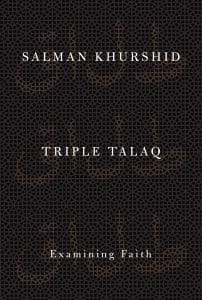Author Salman Khurshid makes an insightful remark on the perils of using every examination of personal law to further the rhetoric of uniform civil code.
Salman Khurshid’s book Triple Talaq: Examining Faith explores the complex and immensely debated issue of contemporary times — the interface between religion and law. Each of the seven chapters of the book throws light on different dimensions of triple talaq. The author’s objective is to provide a “ringside view” of the developments that led the Supreme Court to declare irrevocable triple talaq or talaq-e-biddat unconstitutional in the Shayara Bano case. The speciality of the book is that it allows the reader a keen insight into developments that informed the decision.
The author has made a nuanced attempt to examine the assumptions made about the concept of talaq in Muslim law by contextualising and analysing it through the lenses of Islamic jurisprudence. An interesting argument is made by the author in favour of the restricted right of man to grant a unilateral divorce to his wife, premised on the logic that equality does not mean uniformity. The author quite convincingly argues that talaq under shariah is neither unilateral nor extrajudicial, by reading attempts at reconciliation by family members of husband and wife, as a necessary part of divorce procedure.
A sound argument is thus made to justify that though not uniform, the divorce system under shariah is “wholistically” equal. Though this reasoning resonates with the idea of ‘equality among equals’ entrenched under Article 14 of the Constitution, it does raise certain questions regarding how one interprets gender equality in personal law. Is this logic sustainable when difficulty in granting uniform rights stem not from different biological capacity and needs, but socio-religious engendering of individuals? Does the reasonableness of this unilateral right of man to pronounce talaq appear flawed, if not incorrect, when the rules assume that since the right/capacity to make an offer for marriage lies with man and not with a woman and therefore, talaq is a right conferred on a man? Does this institution allow women to equally assert this right to dissolve the marriage?
The book could have explored the above argument by examining the feasibility of interpreting khula (dissolution of marriage at the instance of the wife in lieu of consideration to husband), as a right of women to free her from matrimony, despite the unwillingness of husband. It would have been interesting to read the author’s take on this discussion in light of the Pakistan Supreme Court’s decision in the Khurshid Bibi case, which has been lauded by several jurists for using judicial creativity to allow judicial khula in case of irretrievable breakdown of a marriage. Although the book does deal with different forms of divorce recognised under Muslim law, this aspect could have further enriched the ‘uniformity-equality’ postulate argued by the author.
This book eruditely challenges the validity of triple talaq by quoting various sources of Muslim law. The author makes an important observation that the interpretations given by Islamic jurists aren’t immutable or infallible. Therefore, the courts should apply the interpretation/ theory (fiqh) that advances equity and justice. These arguments raise pertinent questions. If the courts aren’t persuaded by the acceptability of any of the theories, can it interpret Muslim law in the light of fundamental rights? Perhaps it wasn’t the premise of this book to deal with these enquiries, but the discussions do pave way for a more engaged debate in future on the extent to which religion may/should inform social institutions.
The author makes an insightful remark on the perils of using every examination of personal law to further the rhetoric of uniform civil code, and rightly points out the intelligence of the judges in Shayara Bano in refraining from giving into such proclivity. While uniform civil code maybe desirable, it is not a guarantee against gender discrimination. The author appears to caution against the purported pragmatism of positing religion and Constitution as two necessarily contradictory value systems. The book concludes by making a riveting case for engaging in a nuanced debate regarding the autonomy of religious groups and the “real essence of peaceful (and plural) co-existence”.
Anumeha Mishra is an assistant professor, Faculty of Law, University of Delhi
 Triple Talaq: Examining Faith by Salman Khurshid’ has been published by Oxford University Press.
Triple Talaq: Examining Faith by Salman Khurshid’ has been published by Oxford University Press.






